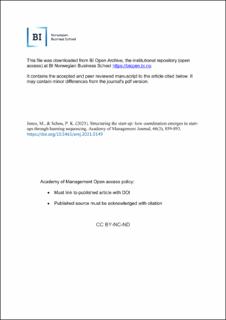Structuring the Start-up: How Coordination Emerges in Start-ups through Learning Sequencing
Peer reviewed, Journal article
Accepted version

View/
Date
2022Metadata
Show full item recordCollections
- Scientific articles [2181]
Abstract
To succeed in growing and scaling their organization, start-ups must establish roles, routines, rules, and plans that coordinate organizational activities. However, early-stage start-ups often lack such coordination mechanisms. Through a longitudinal qualitative multiple-case study of five start-ups, we develop an emergent theoretical framework for how start-ups develop and improve coordination over time. We find that start-ups establish coordination through a learning sequence consisting of four distinct learning styles. To develop coordination successfully, start-ups anticipate coordination problems before they escalate, steal ideas and frameworks from others, experimentally implement coordination, and combine and simplify coordination mechanisms. By providing a processual understanding of how start-ups develop coordination, we contribute to the literature on coordination in start-ups, which has tended towards static explanations. We also add to the literatures on emergent coordination and organizational learning, as we highlight the role of deliberate learning in developing coordination, and how different learning styles link together to create learning sequences.
